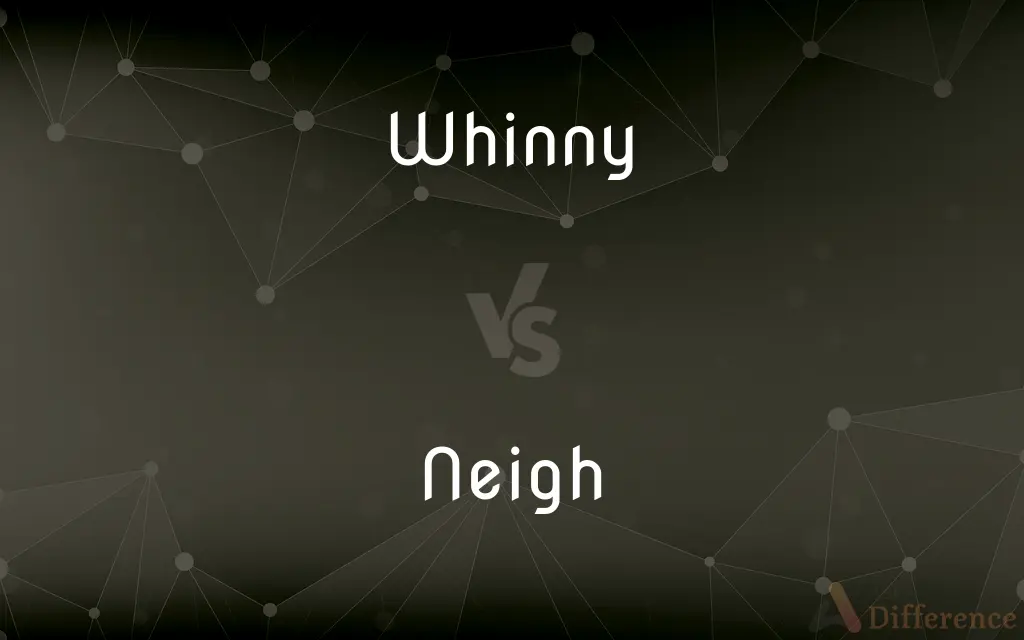Whinny vs. Neigh — What's the Difference?
By Tayyaba Rehman & Urooj Arif — Updated on April 3, 2024
A whinny is a soft, gentle sound horses make, often as a greeting; a neigh is louder, expressing excitement or distress.

Difference Between Whinny and Neigh
Table of Contents
ADVERTISEMENT
Key Differences
Whinny is a sound horses make that is often softer and more melodic, used as a form of greeting or communication among horses, while a neigh is typically louder and more abrupt, usually signaling excitement, alarm, or the presence of something unfamiliar. Both sounds are forms of vocalization that horses use to express emotions and communicate with each other and humans, but they serve different purposes and are used in different contexts.
A whinny can be seen as a way for horses to maintain contact with each other, especially when they are out of sight. It’s a gentle, sometimes almost musical sound that can convey contentment or a desire for companionship, whereas a neigh is more about immediate reaction to situations, such as a sudden arrival of a person or another animal, or a response to being startled.
While a whinny might be used more frequently in social interactions among horses, indicating a desire for closeness or attention, a neigh might serve as a warning or a call for help. This difference highlights the nuanced ways horses communicate with their herd and with humans, reflecting the complexity of their social structures and emotional lives.
Horses might whinny softly to a familiar handler or horse as a sign of recognition or affection, signaling a positive and calm state of mind. On the other hand, a horse might neigh loudly when it is separated from its herd or if it perceives a threat, demonstrating a state of agitation or distress.
The context in which a horse uses these vocalizations is key to understanding their meaning. A horse’s whinny at the sight of a familiar face might be a sign of greeting, while a neigh could be a reaction to something new or worrying in the environment, highlighting how horses use different sounds to navigate their relationships and surroundings.
ADVERTISEMENT
Comparison Chart
Sound Level
Softer, gentler
Louder, more forceful
Purpose
Greeting, social interaction
Alerting, expressing excitement or distress
Emotional State
Often contentment, seeking attention
Excitement, alarm, possibly fear
Usage Context
Maintaining contact, expressing affection
Reacting to stimuli, calling attention
Frequency
May occur frequently in a calm, social environment
Less frequent, associated with specific events or changes
Compare with Definitions
Whinny
A form of equine communication used in social interactions.
The horse's whinny was heard across the barn as it greeted its companion.
Neigh
A loud, high-pitched call of a horse.
The stallion's neigh echoed through the field as it spotted a stranger.
Whinny
An expression of seeking attention or companionship.
The lonely horse whinnied softly, hoping for a response.
Neigh
A form of vocalization signaling a reaction to the environment.
The horse neighed loudly when its pasture mate ran by.
Whinny
Used to maintain contact with herd members.
Separated by the fence, the horse whinnied, reaching out to its friends.
Neigh
Used to alert or call attention to something specific.
The mare neighed sharply, warning the others of the approaching danger.
Whinny
A sign of recognition or affection toward humans or horses.
She smiled when her horse whinnied gently as she approached.
Neigh
Can indicate a horse's agitation or need for the herd.
Separated from the herd, the horse’s neigh was loud and persistent.
Whinny
A soft, gentle sound made by horses.
The mare gave a soft whinny as her foal approached.
Neigh
Expresses excitement, alarm, or distress.
Hearing the thunder, the horses started to neigh anxiously.
Whinny
To neigh, as a horse, especially in a gentle tone.
Neigh
The long, high-pitched sound made by a horse.
Whinny
To express in a whinny.
Neigh
To utter the characteristic sound of a horse; whinny.
Whinny
The sound made in whinnying; a neigh.
Neigh
The cry of a horse.
Whinny
A gentle neigh.
Neigh
(of a horse) To make its cry.
Whinny
To make a gentle neigh.
Neigh
To make a sound similar to a horse's cry.
Whinny
To utter the ordinary call or cry of a horse; to neigh.
Neigh
(obsolete) To scoff or sneer.
Whinny
The ordinary cry or call of a horse; a neigh.
Neigh
To utter the cry of the horse; to whinny.
Whinny
Abounding in whin, gorse, or furze.
A fine, large, whinny, . . . unimproved common.
Neigh
To scoff or sneer; to jeer.
Neighed at his nakedness.
Whinny
The characteristic sounds made by a horse
Neigh
The cry of a horse; a whinny.
Whinny
Characteristic of horses
Neigh
The characteristic sounds made by a horse
Neigh
Characteristic of horses
Common Curiosities
Is a whinny always a happy sound?
While whinnies are often associated with positive emotions, they can also express a range of feelings, including the desire for companionship.
Can humans differentiate between a whinny and a neigh?
With some experience and attention to the context, many people can learn to distinguish between a horse's whinny and neigh based on the sound and situation.
Are these vocalizations used with humans or just other horses?
Horses use these sounds to communicate with both humans and other horses, though the context and meaning may differ slightly.
Do horses neigh only when they are scared?
Horses can neigh for various reasons, not just fear. Excitement, alerting others, and reacting to their environment are common reasons for neighing.
Can all horses whinny and neigh?
Yes, all horses are capable of both whinnying and neighing, but the reasons and contexts for each sound may vary.
Are whinnies and neighs used in the wild?
Yes, wild horses also whinny and neigh for similar reasons as domesticated horses, such as maintaining herd cohesion and expressing emotions.
How do horses respond to human attempts to mimic these sounds?
Horses might respond to human attempts to whinny or neigh out of curiosity or recognition, though responses can vary widely.
Can a neigh or whinny indicate a horse’s health?
Changes in a horse's vocalizations, such as sudden silence or excessive noise, could indicate health or well-being issues that need attention.
Does the meaning of a whinny or neigh vary between horse breeds?
While the basic purposes of whinnies and neighs are consistent, individual horses and breeds may have variations in how frequently and in what contexts they use these sounds.
Is there a best time to listen for a horse whinnying or neighing?
Early morning or late evening, when horses are more active or during feeding times, can be good times to hear these vocalizations.
How do foals learn to whinny or neigh?
Foals pick up these vocalizations by observing and mimicking their mothers and other horses in the herd.
Do horses have unique whinnies and neighs?
Yes, similar to humans with voices, horses have unique sounds that can be recognizable to those familiar with them.
Can a horse’s whinny or neigh change over time?
Yes, a horse's vocalizations can change with age, experience, and changes in their social or physical environment.
How do other animals react to horse whinnies and neighs?
Animals familiar with horses, like farm animals, may show little reaction, while others might be startled or curious.
Are there other sounds horses make besides whinnies and neighs?
Horses also snort, blow, and squeal, among other sounds, each with different meanings and uses in communication.
Share Your Discovery

Previous Comparison
Indigo vs. Violet
Next Comparison
Amidst vs. AmidAuthor Spotlight
Written by
Tayyaba RehmanTayyaba Rehman is a distinguished writer, currently serving as a primary contributor to askdifference.com. As a researcher in semantics and etymology, Tayyaba's passion for the complexity of languages and their distinctions has found a perfect home on the platform. Tayyaba delves into the intricacies of language, distinguishing between commonly confused words and phrases, thereby providing clarity for readers worldwide.
Co-written by
Urooj ArifUrooj is a skilled content writer at Ask Difference, known for her exceptional ability to simplify complex topics into engaging and informative content. With a passion for research and a flair for clear, concise writing, she consistently delivers articles that resonate with our diverse audience.














































